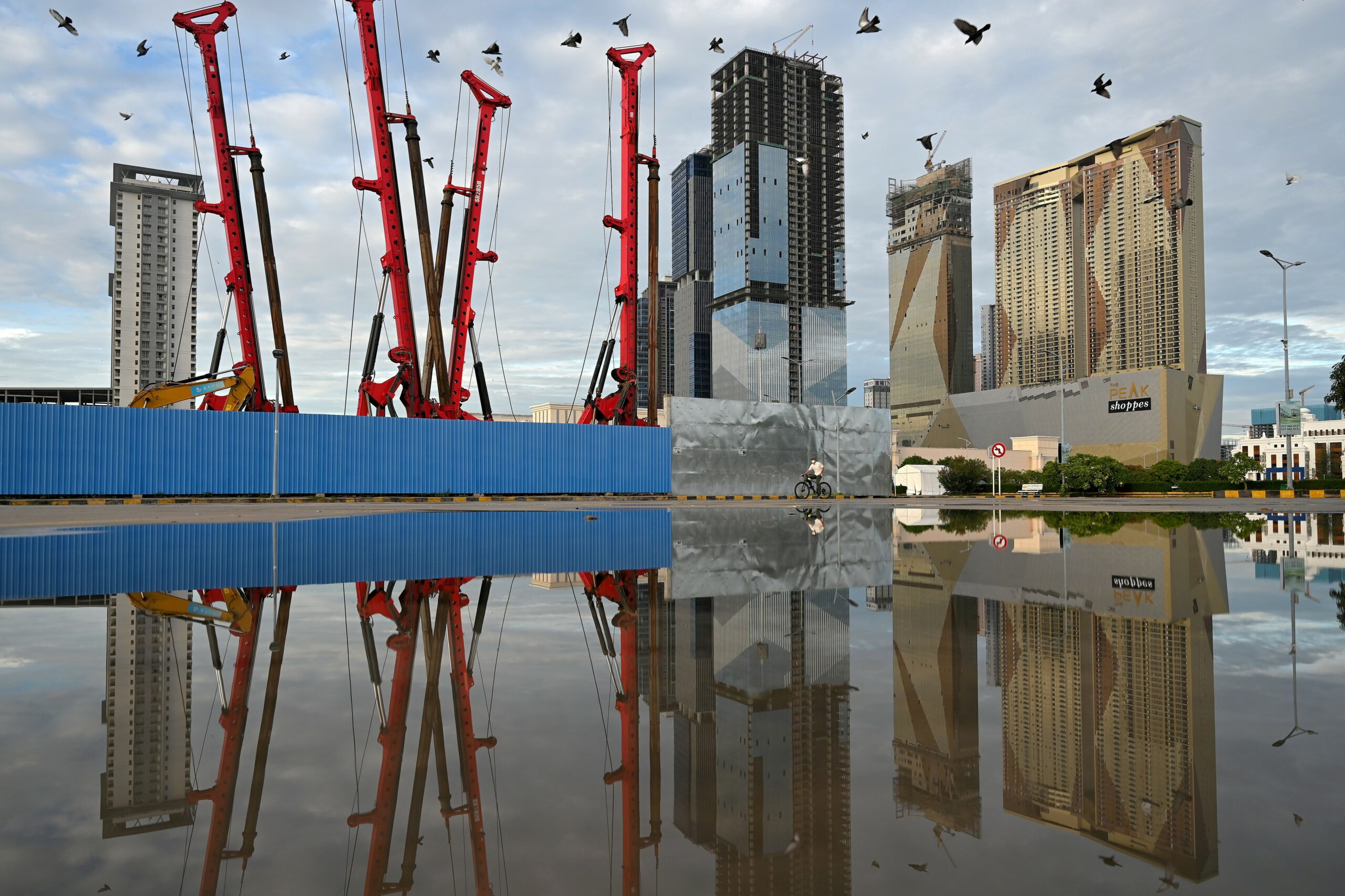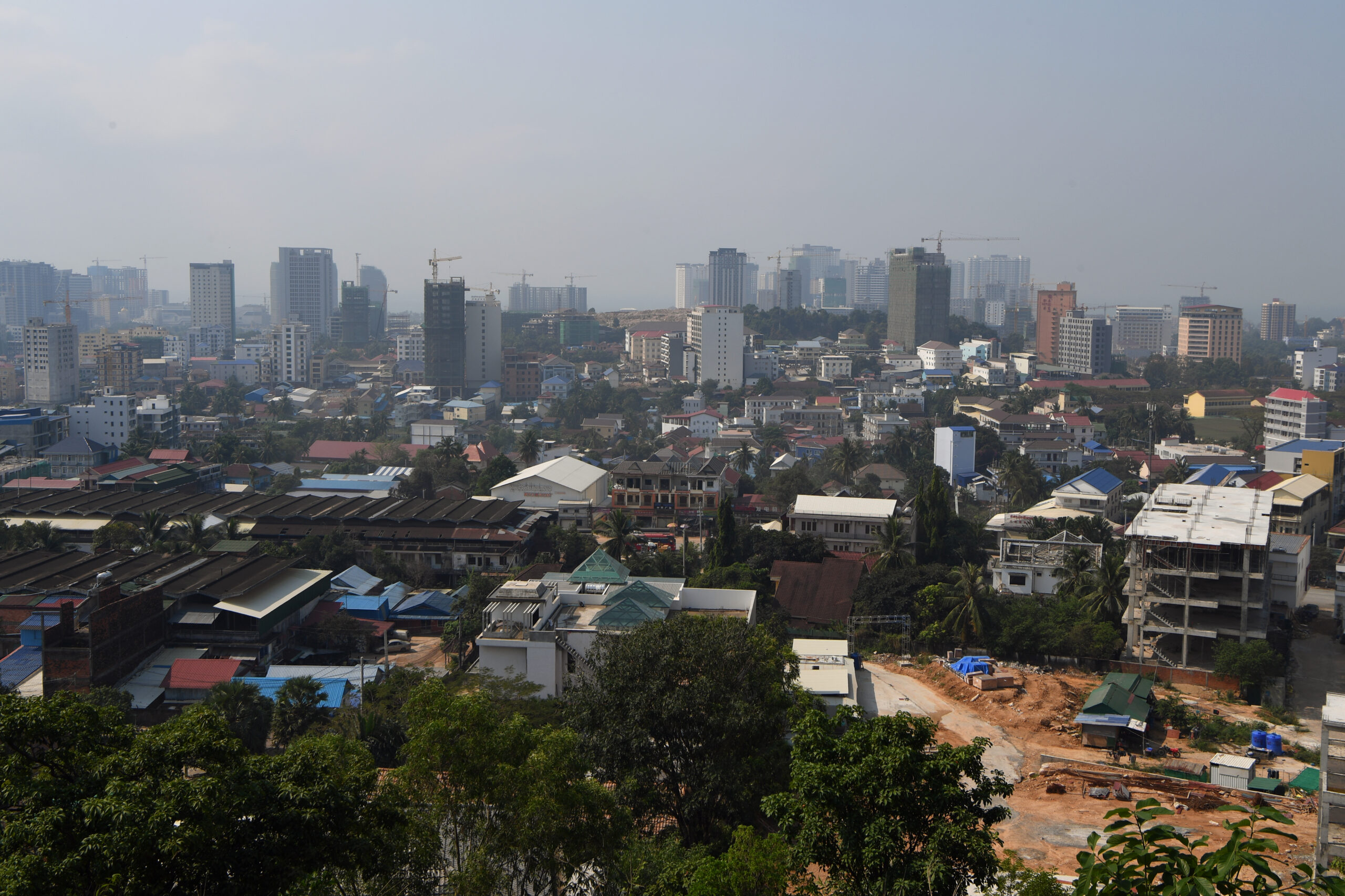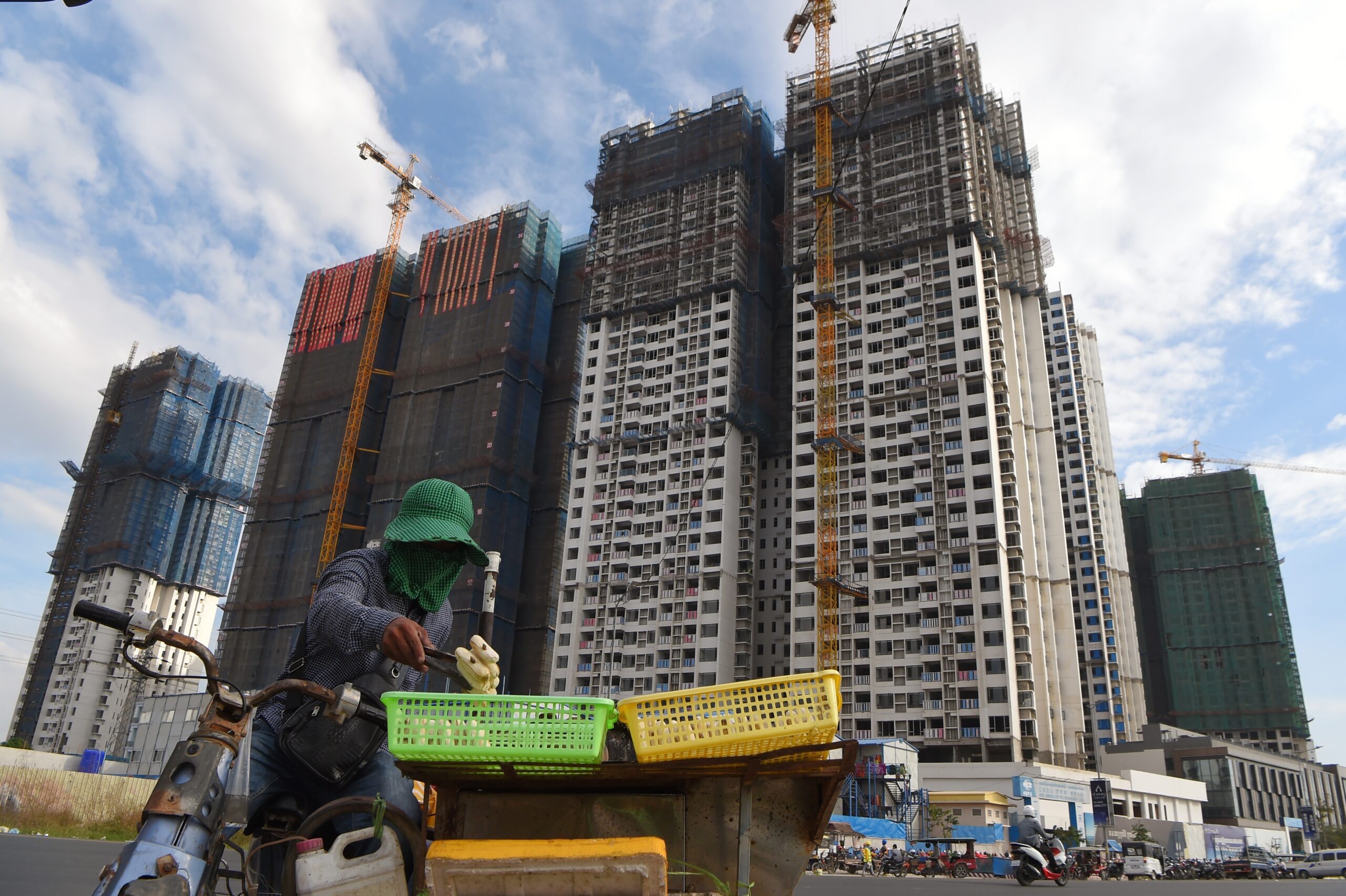Up the spiral staircase in the wood-panelled cigar room of Phnom Penh’s Sofitel Hotel, Denis Cokovic drew a thumb along the coffee table in an imaginary map of his Koh Kong megaproject.
Spanning 1,200 square kilometres (463 square miles), Cokovic said the eventual “smart city” will cost $600 billion to build with completion in no more than seven years: “We attack every area, every location, every project, at the same time.”
The project will involve 120 architects (“The best in the world – I’m sure you know 50% of them”) and 3,140 investment partners (“Famous companies, popular, famous… very high level, only top, top in the world”), he said.
The project’s exact location, the identities of the investors or the sources of their money, he would not say.
“The more people that say this is a scam, I’m more happy,” said Cokovic, nestling back on the orange sofa as he traded between a macchiato and a glass of amber cognac. “Who cares about them?”
The project is one of a long litany of what real estate professionals call at best ambitious and at worst predatory as developers look to attract foreign investors to Cambodia. Often including buzzwords like “smart city” or “blockchain technology,” megaprojects proposed in recent years have boasted price tags in the billions and promised to deliver grandiose cities or towering buildings on aggressively fast timelines. Many have never materialised.
While developers often propose huge projects with genuine intentions, a handful of real estate professionals who spoke on the condition of anonymity described a freewheeling environment in which land speculation is rampant and regulations are easily manipulated, allowing companies to announce untenable projects with an air of legitimacy.
In 2019, Kosovan citizen Cokovic was sentenced to two years in prison for defrauding his former business partner, Southeast Asia Television executive Khim Rany, out of more than $20 million for proposed resorts in Siem Reap, Kep and Kampot. (Cokovic maintains that Rany and her husband defrauded him.)
Less than four months after his October release from Prey Sar Prison, Cokovic announced another megaproject. An article on the government-aligned Fresh News website pictured him alongside his Cambodian business adviser, lawyers and the governor of Koh Kong province. Cokovic promised the project would provide residents of the coastal province “a rich life for all your children.”
Six real estate and development professionals called the project “insane” or “ridiculous” in conversations for which they requested anonymity out of fear of angering government officials or developers.
“This is an obvious scam,” Stephen Higgins, a longtime Cambodia investor and founder of Mekong Strategic Partners, stated on Twitter, linking to a since-deleted version of the same article in a different publication. “Why does the Khmer Times run stuff like this??”
Aside from real estate, Cokovic’s Bilderberg Group website advertises a range of ventures such as a “Wealthy Farmers” programme and a “world-class” film school.
Company team members listed on the website included Sir Tony Baldry, a former British parliamentarian, who said in an email he had never heard of Cokovic nor travelled to Cambodia. A Bilderberg representative said in an email shared with the Globe that the reference was to “a completely different person with the same name.” Sir Tony deemed the claim “bonkers.” His name has since been deleted from the website.
Throughout a two-hour interview, Cokovic defended himself against industry scepticism: “We bring money. We invest money. What kind of scam?”

Since a property boom overtook Cambodia starting in the mid-2000s, Phnom Penh has become a “massive construction site,” University of California-Irvine anthropologist Sylvia Nam observed in a recent study.
Fueled by foreign investors and overseas condominium owners, alongside what Nam called “legal fictions” such as shell companies, the capital city as well as the former gambling destination of Sihanoukville in southwest Cambodia have seen their skylines shift dramatically.
The influx of foreign investment has helped to boost economic development and infrastructure, said Ross Wheble, the country head of brokerage Knight Frank. But as a frontier economy, “there are also investors that come to Cambodia to take advantage of the loose regulatory framework.”
“The impact of that is that there are some projects that are launched and that are not completed,” Wheble said.
The Financial Action Task Force (FATF), an inter-governmental body that relisted Cambodia on its “grey list” for increased financial monitoring in 2019, has named real estate one of the country’s three high-risk sectors. After seeing few changes by the government, FATF said in March there could be additional steps such as “calling on its members and urging all jurisdictions to apply enhanced due diligence to business relations and transactions.”
Some luxury condos are advertised cheap to overseas buyers but never delivered, or built to severely reduced quality. Other companies push cryptocurrency purchases for investment in real estate projects with vows of massive profits, development professionals and researchers said.
“Investors that are not that experienced – maybe they made money in property booms elsewhere – they see it as an up-and-coming market, think they’re going to win big as a first mover,” one expert said. “The numbers don’t add up, and the price tags feed into the image of a company they’re trying to build that’s cash-rich or has ambitions.”
Malaysian firm SV International had it all, according to a 2016 promotional video.
Narrated by a British voiceover with Chinese subtitles, the video flashed images of people cheering around a roulette table and men in suits shaking hands. SV International, the narrator said, would “rapidly take the gaming arena by storm” with Sihanoukville casino and hotel projects to form an “empire.”
In 2018, executives announced a $1 billion, 65-hectare (160-acre) megaproject called Wisney World that would include water parks, casinos and hotels, according to a Phnom Penh Post article. An event announcing the project on Koh Pich island drew 6,000 people, mostly Chinese nationals but also government officials.
Later that year, Cambodia China Times reported, the company promoted cryptocurrencies at another gathering attended by about 8,000 people.
After more than a year they didn’t even get a penny back…does anyone know what’s going on?”
Yet Taiwanese and mainland China officials had been investigating SV International for suspected multilevel marketing schemes as far back as 2016, while the company had been blacklisted by Malaysia’s central bank for alleged illegal fundraising, according to Taiwanese media reports and CC Times.
On a Chinese blog, dozens of people lamented that they or their parents had been duped.
“After more than a year they didn’t even get a penny back,” wrote one person who said an elderly relative had invested. “Does anyone know what’s going on?”
“I don’t know what to do,” wrote another.
SV International deleted its website and scrubbed most of its online and physical presence. There are homes at the listed Koh Pich address of its locally registered company, Salient Ventures; neighbours and security guards said the house number did not exist. In a nearby borey, a gated community, a similar listing led to the 19th floor of a residential apartment building.
SV International executives did not respond to emails listed on business registration documents. The Malaysian Business Chamber of Cambodia said it did not have contact information for the principals and had “no knowledge of their project status as of now.”

Other prime development sites have sat empty for years even when companies have a track record of delivering.
Across the street from NagaWorld Casino in Phnom Penh, construction barriers surround a plot overlooking the busy Sisowath Quay roadside. Behind the wall where a few tuk-tuks were parked, there was no visible machinery and patches of grass stood waist-high.
More than six years ago, developer Thai Boon Roong promised the site would soon become home to the tallest structure in Southeast Asia, 133-storey ‘Twin Towers’ with luxury apartments, condos and a hotel.
In a July Facebook post, project architect Tous Saphouen insisted the plans had not changed and would go forward even though “many friends” wondered otherwise.
It’s the same reassurance Saphoeun gave four years ago, when the Phnom Penh Post ran a sceptical piece referencing the “conspicuous absence of heavy equipment on the construction site and the coma-like state of the project’s sales showroom.”
The project was pitched as a joint venture between Macau-owned Sun Kian Ip Group and Thai Boon Roong, known for its late founder Teng Bunma, a hot-headed billionaire who once famously shot out the tires of a plane for losing his luggage.
Sun Kian Ip’s chairman was convicted in 2017 of corruption and money laundering after bribing United Nations ambassadors to support construction of a Macau conference centre, according to the U.S. Department of Justice. The following year, Chinese media reported another firm slated to provide engineering and construction pulled out of the $2.7 billion project, citing a lack of sufficient funds.
Three real estate professionals noted the appetite for luxury condo projects in Phnom Penh was already cooling off when the project was proposed in 2015.
The Covid-19 pandemic worsened that dynamic: Half of all Phnom Penh condo projects slated for 2021 completion were delayed, according to property management firm CBRE.
Neither Saphoeun nor the Thai Boon Roong principal listed on company registration documents responded to requests for comment. An administrator at the Thai Boon Roong offices in Phnom Penh’s Daun Penh neighbourhood said no one was available to discuss the project.
Cokovic’s record of unfinished projects is long, ranging from city apartments in Siem Reap to waterfront villas in Thailand. Plans were disrupted when he went to prison, he said.
Cokovic claimed Kao Kim Hourn, a government minister delegate who did not respond to multiple requests for comment, defrauded him out of $59 million with the help of Hourn’s wife, Khim Rany.
Rany at one point was listed as an executive at Pallas Investment Group, which proposed a $23 billion megaproject in Kampot in 2016 that never came to fruition. A Thai woman Cokovic referred to as his adopted daughter, Siriluck Choochart, was also a Pallas executive and was charged in the case that led to his conviction.
Cokovic said he proposed another project in Cambodia due to his full trust in the government and rule of law. He added that his experience would encourage other investors to join him.
“I see how the legal system, how human rights work,” he said. “So they’re more confident to come here and invest with me.”
Still, his project team receives frequent Facebook messages with fraud accusations, largely from expats he claimed are “under my ex-partner’s control.” Yet even as he railed against the idea that he could be perpetrating one himself, the investor waved a hand in agreement with the suggestion of widespread real estate scams in Cambodia.
“This happens,” he said. “This happens every day.”


